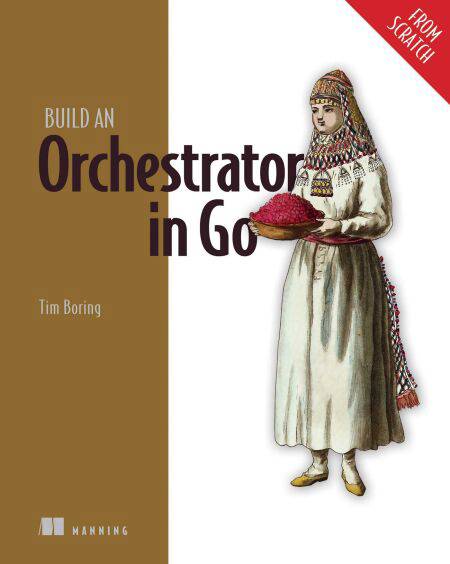
- Retrait gratuit dans votre magasin Club
- 7.000.000 titres dans notre catalogue
- Payer en toute sécurité
- Toujours un magasin près de chez vous
- Retrait gratuit dans votre magasin Club
- 7.000.0000 titres dans notre catalogue
- Payer en toute sécurité
- Toujours un magasin près de chez vous
49,20 €
+ 49 points
Format
Description
Develop a deep understanding of Kubernetes and other orchestration systems by building your own with Go and the Docker API.
Orchestration systems like Kubernetes can seem like a black box: you deploy to the cloud and it magically handles everything you need. That might seem perfect—until something goes wrong and you don’t know how to find and fix your problems. Build an Orchestrator in Go (From Scratch) reveals the inner workings of orchestration frameworks by guiding you through creating your own.
In Build an Orchestrator in Go (From Scratch) you will learn how to:
Identify the components that make up any orchestration system Schedule containers on to worker nodes Start and stop containers using the Docker API Manage a cluster of worker nodes using a simple API Work with algorithms pioneered by Google’s Borg Demystify orchestration systems like Kubernetes and Nomad
Build an Orchestrator in Go (From Scratch) explains each stage of creating an orchestrator with diagrams, step-by-step instructions, and detailed Go code samples. Don’t worry if you’re not a Go expert. The book’s code is optimized for simplicity and readability, and its key concepts are easy to implement in any language. You’ll learn the foundational principles of these frameworks, and even how to manage your orchestrator with a command line interface.
About the technology
Orchestration frameworks like Kubernetes and Nomad radically simplify managing containerized applications. Building an orchestrator from the ground up gives you deep insight into deploying and scaling containers, clusters, pods, and other components of modern distributed systems. This book guides you step by step as you create your own orchestrator—from scratch.
About the book
Build an Orchestrator in Go (From Scratch) gives you an inside-out perspective on orchestration frameworks and the low-level operation of distributed containerized applications. It takes you on a fascinating journey building a simple-but-useful orchestrator using the Docker API and Go SDK. As you go, you’ll get a guru-level understanding of Kubernetes, along with a pattern you can follow when you need to create your own custom orchestration solutions.
What's inside
Schedule containers on worker nodes Start and stop containers using the Docker API Manage a cluster of worker nodes using a simple API Work with algorithms pioneered by Google’s Borg
About the reader
For software engineers, operations professionals, and SREs. This book’s simple Go code is accessible to all programmers.
About the author
Tim Boring has 20+ years of experience in software engineering. For most of that time he has worked with orchestration systems, including Borg, Kubernetes, and Nomad.
Table of Contents
PART 1 INTRODUCTION
1 What is an orchestrator?
2 From mental model to skeleton code
3 Hanging some flesh on the task skeleton
PART 2 WORKER
4 Workers of the Cube, unite!
5 An API for the worker
6 Metrics
PART 3 MANAGER
7 The manager enters the room
8 An API for the manager
9 What could possibly go wrong?
PART 4 REFACTORINGS
10 Implementing a more sophisticated scheduler
11 Implementing persistent storage for tasks
PART 5 CLI
12 Building a command-line interface
13 Now what?
Orchestration systems like Kubernetes can seem like a black box: you deploy to the cloud and it magically handles everything you need. That might seem perfect—until something goes wrong and you don’t know how to find and fix your problems. Build an Orchestrator in Go (From Scratch) reveals the inner workings of orchestration frameworks by guiding you through creating your own.
In Build an Orchestrator in Go (From Scratch) you will learn how to:
Identify the components that make up any orchestration system Schedule containers on to worker nodes Start and stop containers using the Docker API Manage a cluster of worker nodes using a simple API Work with algorithms pioneered by Google’s Borg Demystify orchestration systems like Kubernetes and Nomad
Build an Orchestrator in Go (From Scratch) explains each stage of creating an orchestrator with diagrams, step-by-step instructions, and detailed Go code samples. Don’t worry if you’re not a Go expert. The book’s code is optimized for simplicity and readability, and its key concepts are easy to implement in any language. You’ll learn the foundational principles of these frameworks, and even how to manage your orchestrator with a command line interface.
About the technology
Orchestration frameworks like Kubernetes and Nomad radically simplify managing containerized applications. Building an orchestrator from the ground up gives you deep insight into deploying and scaling containers, clusters, pods, and other components of modern distributed systems. This book guides you step by step as you create your own orchestrator—from scratch.
About the book
Build an Orchestrator in Go (From Scratch) gives you an inside-out perspective on orchestration frameworks and the low-level operation of distributed containerized applications. It takes you on a fascinating journey building a simple-but-useful orchestrator using the Docker API and Go SDK. As you go, you’ll get a guru-level understanding of Kubernetes, along with a pattern you can follow when you need to create your own custom orchestration solutions.
What's inside
Schedule containers on worker nodes Start and stop containers using the Docker API Manage a cluster of worker nodes using a simple API Work with algorithms pioneered by Google’s Borg
About the reader
For software engineers, operations professionals, and SREs. This book’s simple Go code is accessible to all programmers.
About the author
Tim Boring has 20+ years of experience in software engineering. For most of that time he has worked with orchestration systems, including Borg, Kubernetes, and Nomad.
Table of Contents
PART 1 INTRODUCTION
1 What is an orchestrator?
2 From mental model to skeleton code
3 Hanging some flesh on the task skeleton
PART 2 WORKER
4 Workers of the Cube, unite!
5 An API for the worker
6 Metrics
PART 3 MANAGER
7 The manager enters the room
8 An API for the manager
9 What could possibly go wrong?
PART 4 REFACTORINGS
10 Implementing a more sophisticated scheduler
11 Implementing persistent storage for tasks
PART 5 CLI
12 Building a command-line interface
13 Now what?
Spécifications
Parties prenantes
- Auteur(s) :
- Editeur:
Contenu
- Nombre de pages :
- 288
- Langue:
- Anglais
- Collection :
Caractéristiques
- EAN:
- 9781638354802
- Date de parution :
- 13-05-24
- Format:
- Ebook
- Protection digitale:
- Adobe DRM
- Format numérique:
- ePub

Les avis
Nous publions uniquement les avis qui respectent les conditions requises. Consultez nos conditions pour les avis.






